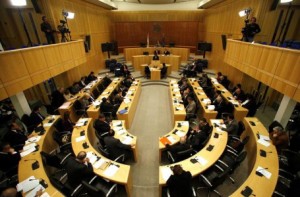Cyprus Parliament dispels the maneuver endorsed by the Euro group
Now they are looking for a plan “B” among many possibilities. Will Nicosia pledge its gas?
UPDATE: The news that the ECB will guarantee Cyprus’ debt in any case appeases the Stock Market, which opened with a slight increase.

This morning by the time you have this article in your hands, the European Markets could have gone crazy; the Italian and Spanish spreads climbed to the stars and Cyprus could be dismissed by the President of the Republic, humiliated yesterday by a Parliament that rejected – without even one vote in favor – the rescue plan of the Island banks agreed by him with the Euro Group. The MPs did not appreciate the part of the agreement that foresees a forced withdrawal from bank accounts, a choice that would have from one side exploded social tension, restrained by the police with difficulty, and broken relations with countries like Russia, whose wealthiest citizens have deposited billions in Cyprus to keep them out of sight. 36 voted “no” in Parliament and 19 abstained. The new President Nicos Anastasiades totally rejected it and his colleague the new President of the Euro club Jeroen Dijsselbloem rejected it. Yesterday many nostalgically remembered times with the competent and observant Jean-Claude Juncker. If the Cypriot stays in place it will only be to not amplify the chaos that has already been created; now there is the challenge of envisioning a possible alternative solution to quickly trace the money that Germany doesn’t want Europe to give to save the little island. It was Angela Merkel’s umpteenth mistake, wanting to force the hand, but this time, unexpectedly, she found a bone harder than Greece. Anyway Nicosia can also look east, to Russia.
No one knows what will happen now but the Euro Group is waiting impatiently for a proposal that must arrive from Cyprus since they rejected the agreement undersigned by Brussels last Saturday. The rush is due to the fact that the local banks could collapse at any moment and many fear this could have a domino effect on the Euro zone, even if in this area the Cypriot economy only has a .2% influence. There are many possibilities even because, as always, it is more a question of principle than substance. To save the Cypriot banks, which are used as piggy banks a bit for all of Europe (nobody is “innocent” from London to Germany to Russia) it seems 16 billion is needed. They found 313 for Greece; therefore, it is a sum that the Euro club could pay without problems. But there are questions of principle to confront. Germany demanded a forced withdrawal on the bank accounts to reach the sum of 5.8 billion- rejected yesterday. It was agreed that the EU would put up the other 10. Thus, in reality Cyprus needed to come up with only 5.8 not 16, which after all, is a sum identical to the probable loss by German banks in Cyprus. Among Europeans, the Germans are the ones who have gained the most from lavish interests paid by the island banks. Even in Greece the German banks were the most exposed – a financial coincidence. Merkel wanted her money back as quickly as possible.
It didn’t work and now, political stability permitting, the plan must be different and inevitably long-term. Also because in 2012 the Cyprus GNP was 17.9 billion, 5.8 is 32.4%. Where can you find a government whose spending budget is 47% of the GNP? Something could be cut but truly a little; there are less than 15 percentage points between the expenditures implemented and the 5.8 requested. They could increase taxes, make some cuts, circulate government securities, ask for help from Russia (who already loaned 2.5 billion in 2011).
While a plane departed from London with a million Euro in cash appropriated for the military in Cyprus who cannot go to the banks because they are closed, one considers Cypriot gas. Large deposits were discovered in the territorial waters and Nicosia could guarantee his exposure with that.
For now a sigh of relief is cast by all these countries, like Italy, where one feared that Cyprus was only a “general example” of the forced withdrawal. In spite of the reassurances that it would not be repeated, nobody trusted it. Now, as the EC would have wanted since the beginning of this wretched proposal, the idea has been buried.
Lorenzo Robustelli for Il Secolo XIX today

![Ragazza in biblioteca. Nell'Ue chi studia non lavora e neppure cerca. In Italia funziona ancor più così [foto: Tulane University, Wikimedia Commons]](https://www.eunews.it/wp-content/uploads/2024/11/Girl_in_the_Library_3638661587-350x250.jpg)
![Cina e Unione europea finiscono al Wto per i dazi [A sinistra: Valdis Dombrovskis, commissario per il Commercio. A destra: Wang Wentao, ministro per il Commercio cinese]](https://www.eunews.it/wp-content/uploads/2024/11/wto-eu-china-350x250.png)






![Ragazza in biblioteca. Nell'Ue chi studia non lavora e neppure cerca. In Italia funziona ancor più così [foto: Tulane University, Wikimedia Commons]](https://www.eunews.it/wp-content/uploads/2024/11/Girl_in_the_Library_3638661587-120x86.jpg)
![Cina e Unione europea finiscono al Wto per i dazi [A sinistra: Valdis Dombrovskis, commissario per il Commercio. A destra: Wang Wentao, ministro per il Commercio cinese]](https://www.eunews.it/wp-content/uploads/2024/11/wto-eu-china-120x86.png)
